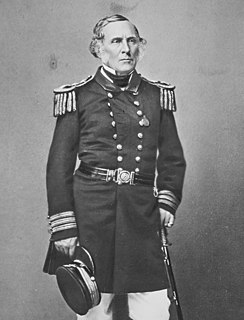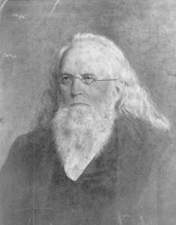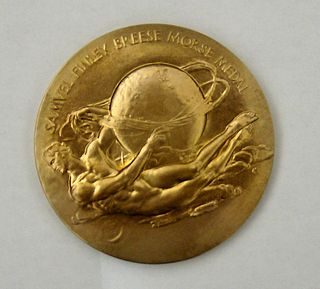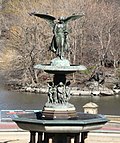
The Oakland Athletics, often referred to as the A's, are an American professional baseball team based in Oakland, California. The Athletics compete in Major League Baseball (MLB) as a member club of the American League (AL) West division. The team plays its home games at the Oakland Coliseum. They have won nine World Series championships.

Samuel Finley Breese Morse was an American inventor and painter. After having established his reputation as a portrait painter, in his middle age Morse contributed to the invention of a single-wire telegraph system based on European telegraphs. He was a co-developer of Morse code and helped to develop the commercial use of telegraphy.

Port Byron is a village in Cayuga County, New York, United States. The population was 1,290 at the 2010 census. It is in the town of Mentz north of Auburn.

Alfred Lewis Vail was an American machinist and inventor. Along with Samuel Morse, Vail was central in developing and commercializing American telegraphy between 1837 and 1844.

Jedidiah Morse was a geographer whose textbooks became a staple for students in the United States. He was the father of the telegraphy pioneer and painter Samuel Morse, and his textbooks earned him the sobriquet of "father of American geography."

Samuel Livingston Breese was a Rear Admiral in the United States Navy. His active-duty career included service in the War of 1812, the Mexican–American War, and the American Civil War.

Sidney Breese, a lawyer, soldier, author and jurist born in New York, became an early Illinois pioneer and represented the state in the United States Senate as well as served as Chief Justice of the Illinois Supreme Court and Speaker of the Illinois House of Representatives, and has been called "father of the Illinois Central Railroad".

Breese Stevens Municipal Athletic Field is a multi-purpose stadium in Madison, Wisconsin. Located eight blocks northeast of the Wisconsin State Capitol on the Madison Isthmus, it is the oldest extant masonry grandstand in Wisconsin.

The Rev. Samuel Finley was an evangelical preacher and academic. He founded the West Nottingham Academy, and was the fifth president and an original trustee of the College of New Jersey from 1761 until 1766.

Samuel F. B. Morse High School is an urban public high school located in southeastern San Diego in the neighborhood of Skyline Hills serving grades 9-12 in the American K-12 education system. Morse, which serves a predominantly socioeconomically-disadvantaged student population, has produced several notable athletes among its alumni and has sent its graduates to numerous colleges and universities throughout the United States including Stanford, MIT, Yale, UCLA, UC Berkeley, Hampton University, Columbia University, UCSD, University of Southern California, Cal Tech, and UC Santa Barbara to name a few.

Locust Grove is a National Historic Landmark estate located on US 9 in the Town of Poughkeepsie, New York. The 200-acre park-like estate includes homes, a carriage house, ice house, trails, a flower garden, and vegetable garden, and it overlooks the Hudson River from a bluff. The property includes a home designed by architect Alexander Jackson Davis for Samuel F. B. Morse, the inventor of the telegraph. An Italianate style mansion, it was completed in 1851.
Gerald Hunter Finley, is a Canadian baritone opera singer.

Samuel Finley Brown Morse was an environmental conservationist and the developer of Pebble Beach. He was known as the Duke of Del Monte and ran his company from the 1919 until his death in 1969. Originally from the eastern United States, Morse moved west and fell in love with the Monterey Peninsula, eventually owning and preserving vast acreage while also developing golf courses and the Lodge at Pebble Beach.
The American Academy of the Fine Arts was an art institution founded in 1802 in New York City, to encourage appreciation and teaching of the classical style. It exhibited copies of classical works and encouraged artists to emulate the classical in their work. The mayor of New York city at the time, Richard Varick, and Gulian Verplanck, a New York politician, were some of the Academy's original organizers. Younger artists grew increasingly restive under its constraint, and in 1825 left to found the National Academy of Design.
The Alexander & Ilse Melamid Medal was established in 2002 by a gift from Ilse Melamid. It is awarded by the American Geographical Society for "outstanding work on the dynamic relationship between human culture and natural resources."

The Samuel Finely Breese Morse Medal was established in 1902. Designed by Laura G. Fraser, this medal is awarded by the American Geographical Society for "achievements and pioneering in geographical research."
Samuel Morse (1791–1872) was an American painter and inventor.

The Morse Building, also known as the Nassau–Beekman Building and 140 Nassau Street, is a residential building in the Financial District of Manhattan in New York City, at the northeast corner of Nassau and Beekman Streets. The Morse Building, designed by Benjamin Silliman Jr. and James M. Farnsworth, contains elements of the Victorian Gothic, Neo-Grec, and Rundbogenstil style.


















